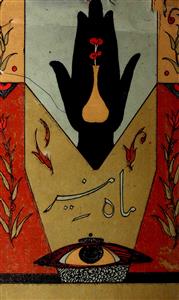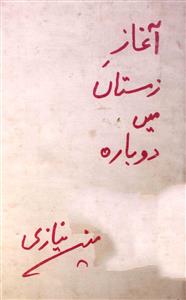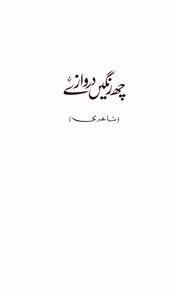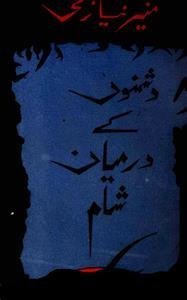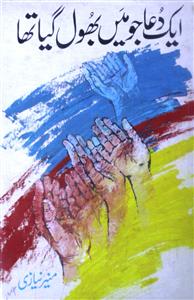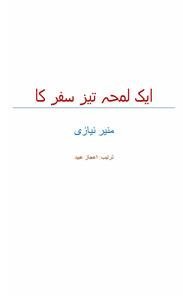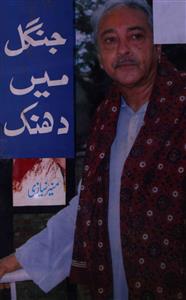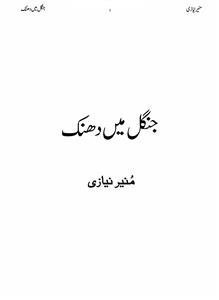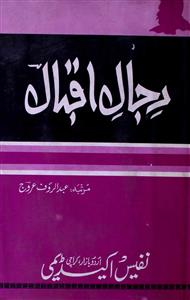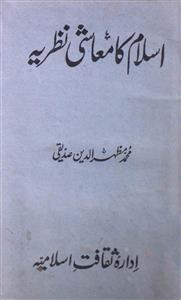 For any query/comment related to this ebook, please contact us at haidar.ali@rekhta.org
For any query/comment related to this ebook, please contact us at haidar.ali@rekhta.org
About The Book
پیش نظر منیر نیازی کا شعری مجموعہ "ماہ منیر" ہے۔ جو ان کی نظموں اورغزلوں پر مشتمل ہے۔ ابتدا حمد باری تعالیٰ اور نعت رسول صلعم سے ہوئی ہے۔ رومانیت کے علمبردار منیر نیازی اپنی داخلی و خارجی واردات کوشاعرانہ پیرائیہ میں اس طرح ڈھالتے ہیں کہ وہ چلتی پھرتی تصاویر بن جاتی ہیں۔ انہوں نے مٹتی انسانی تہذیب اور حیوانی درندگی کے لیے نئی نئی علامتوں اور استعاروں کا استعمال کیا ہے۔ "ماہ منیر" کو کھلے منظروں کی کائنات کہتے ہوئے سہیل احمد لکھتے ہیں۔ "ماہ منیر کھلے منظر وں کی کائنات ہے۔ اس لیے ان نغموں میں بار بار چمک اور مختلف مظاہر اس چمک کے اثر کا بیان ہوا ہے۔ ان نغموں اور غزلوں میں جو تصویر یں بار بار سامنے آتی ہیں۔ وہ اسی چمک اور اسی نور سے مناظر کی رنگت تبدیل ہونے کی داستان بیان کرتی ہیں۔ یہاں نیلے سمندر اور اس دھوپ کے شیشے کی چمک کا رشتہ بھی ہے اور کسی چشم نم پر مہر کی اولین کرن کا اثر بھی، پر تو خورشید سے چمکتے ہوئے دریچے بھی ہیں اور چاند کی روشنی کا مکانوں کی سیہ رنگت کے ساتھ پر اسرار رابطہ بھی۔"
About The Author
The last half decade of the twentieth century can be called the era of Munir Niyazi. Through his Urdu and Punjabi poetry, he made a profound impact on at least three generations and left such a deep impression that he became a legend and his poetry became a classic. His poetry is a fragrance of feelings and attitudes of the whole era. Munir's poetry is comprehensive and all-encompassing ideas are expressed in such a way that everyone can find meanings according to their ability. In his poetry, there is a hell-like field of human life and also the lost paradise of man. Munir Niyazi's poetry combines the two into one.
Munir Niazi's poetry resembles the first glimpse of a long exile. This poetry has an extraordinary ability to revive amazing, forgotten, lost experiences that is not seen in other poets. Munir's poetry is not concerned with ideas or sciences, but with the essence and essence of poetry. By recognizing himself as a poet, he realizes and tries to comprehend his existence as a poet and person.
Munir Niyazi was born on April 19, 1928, to a Pashtun family in the town of Khanpur in Hoshiarpur. His father Muhammad Fateh Khan was employed in the Anhar department but the rest of the family was in the army or transport department. Munir was one year old when his father died. He was raised by his mother and uncles. His mother was fond of reading books and it was from her that the literary taste passed to Munir Ever since he was a boy, whenever Munir was surprised by something, he would try to mold it into a poetry. Munir received his early education in Montgomery (now Sahiwal) and from there passed the matriculation examination and joined the Navy as a sailor. But the discipline here was against his temper. During his working days, he would sit alone on the shores of Bombay and read Saadat Hassan Manto's stories and Meera Ji's poems published in "Adabi Dunya". In those days his literary interest flourished and he resigned from the Navy and completed his education and at the same time began a regular career in writing. He graduated from Dayal Singh College, Lahore with a B.Sc., and also wrote some English poems during this time. After completing his education, the country was divided and his entire family moved to Pakistan. Here he set up a publishing house in Sahiwal which was in deficit. After running a small failed business, Munir moved to Lahore. In collaboration with Majeed Amjad, he issued a journal "Sat-Rang". In the 1960s, he wrote songs for movies that became very popular. Among them was Naseem Bano's song for the 1962 film "Shaheed" "Us Bewafa Ka Shahar Hai Aur Hum Hai Dosto", and the same year for the film "Sasural" sung by Mehdi Hassan. But later he became completely immersed in his literary poetry.
Munir was very popular among women due to his attractive appearance. He confessed that he had fallen in love more or less forty times. In an interview, he had said, "This isn’t the time of Laila Majnoon. It is not the time to lose one's whole life by seeing the face of one beloved shining through the veil of veil. Despite this free-spiritedness, in 1958, he married Begum Naheed. He was quite a self-praising poet, and barely found pros in other poets. Although among classical poets, Mir, Ghalib and Siraj Aurangabadi were his favorites. At most, he used to call the poets of his time fine or faintly good. He famously called Kishwar Naheed a good poet and Parveen Shakir a second-class poet.
Munir Niazi is one of the poets who claims to be a great poet in two different languages, Urdu and Punjabi. Similarly, Munir has equally raised the standard of his poetry in both the genres of poetry, ghazal and Nazm. He also wrote songs and some prose poems. Munir Niazi was addicted to alcohol and called it bad for everyone except himself. In his last years, he contracted a respiratory disease and died on December 26, 2006. The Government of Pakistan awarded him first the Star of Distinction and then the Pride of Performance (Perfect Art) medals.
Munir Niazi is one of those poets who strengthened his identity with the atmosphere which was automatically formed by his poetry. There is a mystery in this atmosphere and also a mixed light that unravels the mystery through symbols and metaphors and transmits a unique state to the reader.
 For any query/comment related to this ebook, please contact us at haidar.ali@rekhta.org
For any query/comment related to this ebook, please contact us at haidar.ali@rekhta.org
